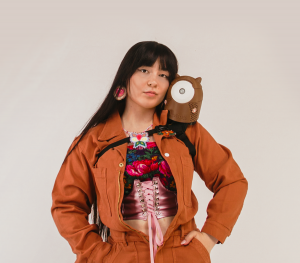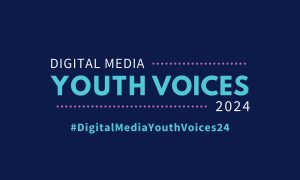 Danielle Boyer is a 23-year-old Indigenous (Ojibwe) robotics inventor and advocate for youth who has been teaching kids since she was ten. She is passionate about making education accessible and representative for her community so that no child is left behind. Danielle creates equitable and innovative learning solutions for Indigenous youths with robots that she designs, manufactures, and gives away for free. In 2019, she created The STEAM Connection, a minority and youth-led charity that has reached 800k+ youth with free, accessible, and representative technical education. The organization has 34k+ users on the Make-A-Robot virtual learning platform, has donated 11k+ free “EKGAR” robotics kits to students, and 100% of their products are designed by youth for youth.
Danielle Boyer is a 23-year-old Indigenous (Ojibwe) robotics inventor and advocate for youth who has been teaching kids since she was ten. She is passionate about making education accessible and representative for her community so that no child is left behind. Danielle creates equitable and innovative learning solutions for Indigenous youths with robots that she designs, manufactures, and gives away for free. In 2019, she created The STEAM Connection, a minority and youth-led charity that has reached 800k+ youth with free, accessible, and representative technical education. The organization has 34k+ users on the Make-A-Robot virtual learning platform, has donated 11k+ free “EKGAR” robotics kits to students, and 100% of their products are designed by youth for youth.
Danielle has been named one of PEOPLE Magazine’s Girls Changing the World, a MIT Solve Indigenous Communities Fellow, a L’oreal Paris Woman of Worth, a Teen Vogue Indigenous Youth Changemaker, a NDN Collective Changemaker Fellow, an Echoing Green Fellow, and a Verizon Forward for Good Winner. She is a two-time guest of the White House and is a featured story in The Big Idea by MIT Solve x HP, an award-winning docu-series on three women innovators. She recently won the MIT Solve Gender Equity in STEM Challenge alongside her student for an Augmented Reality app called Super Sisters, which had 350k+ users during a month of beta testing.
In 2024, my digital resolution is to leverage the power of storytelling and digital media to uplift my community and Indigenous voices. I aim to amplify the richness of our culture and traditions, sharing our narratives in a way that fosters understanding and appreciation for Anishinaabe culture. Through various digital platforms, I aspire to create a positive and authentic representation of our community, shedding light on our unique ways of life.
My focus is on enhancing the amplification of Indigenous voices and fostering a safer online environment. I believe it is crucial to create digital spaces that not only recognize but actively promote the diverse perspectives and experiences of Indigenous communities. This involves developing mechanisms that prioritize the visibility of Indigenous voices, stories, and cultures in a respectful and authentic manner. Additionally, a concerted effort should be made to address safety concerns by implementing more robust measures to combat online harassment, misinformation, and other threats that can compromise the well-being of individuals and communities digitally. By striving for both inclusivity and safety, we can contribute to a more equitable and positive digital landscape in 2024.
I believe that one of the most significant issues facing youth today in relation to technology and digital media is the impact of social media on mental health and wellbeing. Social media platforms have become an integral part of young people’s lives, shaping our relationships, self-esteem, and perception of the world. While these platforms offer connectivity and information sharing, they also present challenges that can adversely affect mental health. I grew up being cyberbullied and facing low self esteem due to the content that I saw shared online. I always was comparing myself to others and it resulted in me disliking many things about myself. Mental health challenges affect many youth.
I feel most hopeful about the transformative power of digital media in providing underrepresented communities, like Indigenous people like me, with a platform to share our stories and foster representation. The ability to share and communicate through digital platforms, such as TikTok, has opened up avenues for education and awareness that were previously limited. One particularly encouraging aspect is the newfound ability to educate people on our hidden histories. Through social media, we can learn about history that has been suppressed in mainstream society and education. The representation afforded by digital media is a significant and empowering development. Our communities now have the means to showcase our cultures, traditions, and perspectives, challenging stereotypes and fostering a more inclusive narrative. This newfound visibility not only provides a sense of pride and validation for those within these communities but also educates and enlightens a broader audience.
I believe that digital media offers many privacy concerns on how young people may not be fully aware of the long-term consequences of sharing personal information online or that things they post will be around for a long time. It can also be difficult to discern misinformation online especially since it is so easily accessible.
Embrace the opportunity to share your unique stories, advocate for your communities, and instigate meaningful change through digital mediums. Stay authentic to you, prioritize your wellbeing and self care, and create a healthy balance between your online and offline life.
Parents and caregivers play a crucial role in supporting their children to develop healthy digital media habits in today’s rapidly evolving technological landscape. Oversight is necessary especially when children are young, given the prevalence of grooming and predatory behaviors online that often go unnoticed by parents. It is essential to be vigilant and proactive in ensuring the safety of children in the digital realm.
Parents should exercise caution when sharing information about their children online. Posting photos of children should be done judiciously, refraining from revealing personal information or locations. Photos can also be used by predators, so be careful what is shared. Understanding that online spaces can be risky, parents need to be mindful of the digital footprint they create for their families. Ultimately, I recommend that parents refrain from posting photos of their children online until they can give informed consent. This approach prioritizes the safety and privacy of the child, allowing them to have agency over their digital presence when they are old enough to understand the implications.
The safe digital habits of children often begin with the behavior modeled by their parents. Parents need to recognize that their online actions set an example for their children, influencing how they navigate the digital world. Being conscious of what is shared online about the family can contribute significantly to fostering a secure online environment.
Another important aspect is respecting age restrictions on social media platforms. Children under the age of 13 are not supposed to have social media accounts, as per most platform guidelines. Enforcing this rule ensures that children are not exposed to potential risks and inappropriate content that may be prevalent on these platforms.
About the 2024 Digital Media Youth Voices Campaign

#DigitalMediaYouthVoices24 provides a glimpse into the hopes and concerns of youth leaders in the digital space. Using their own words, the campaign aims to elevate and amplify the voices of youth themselves as they work to create a healthy digital future.